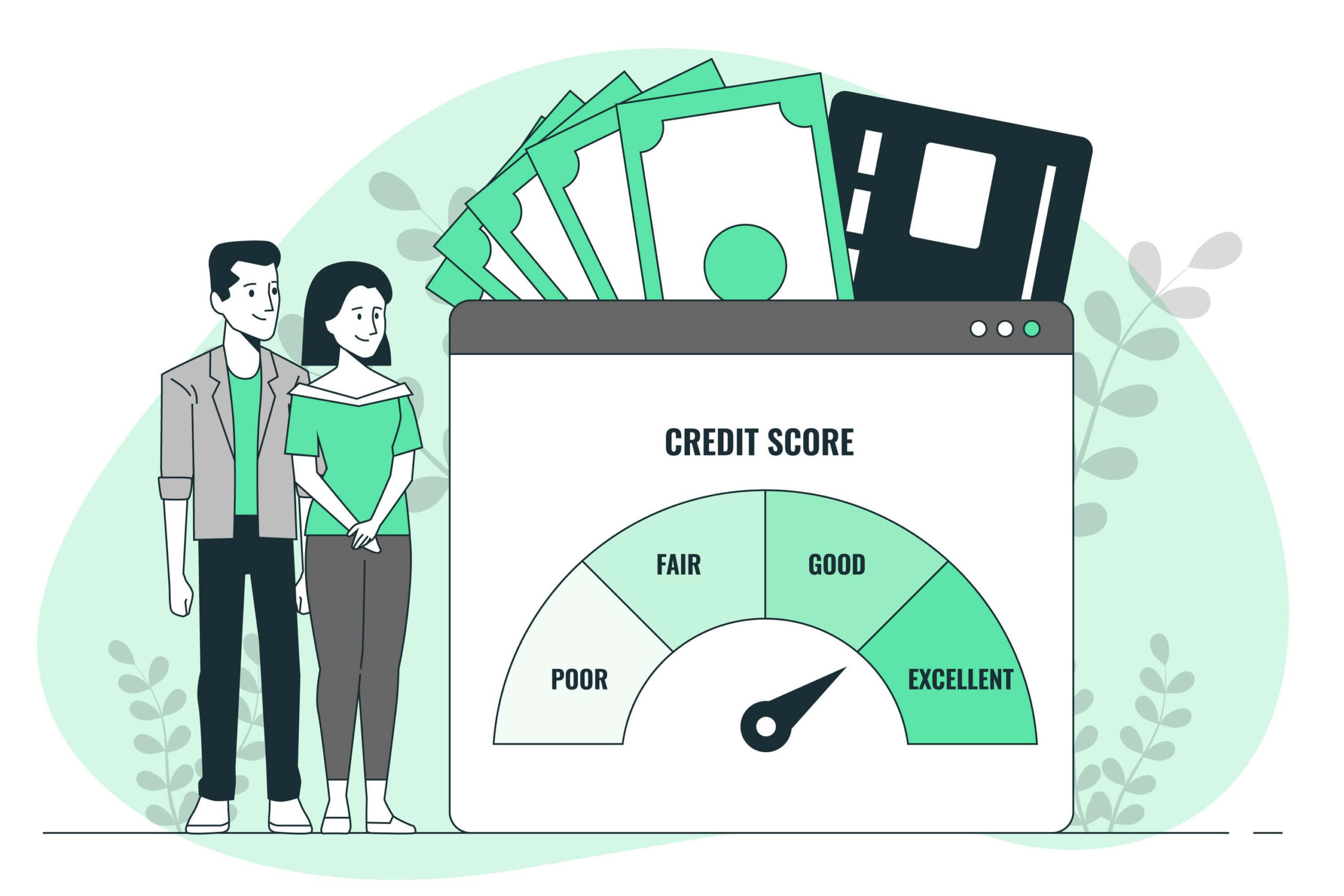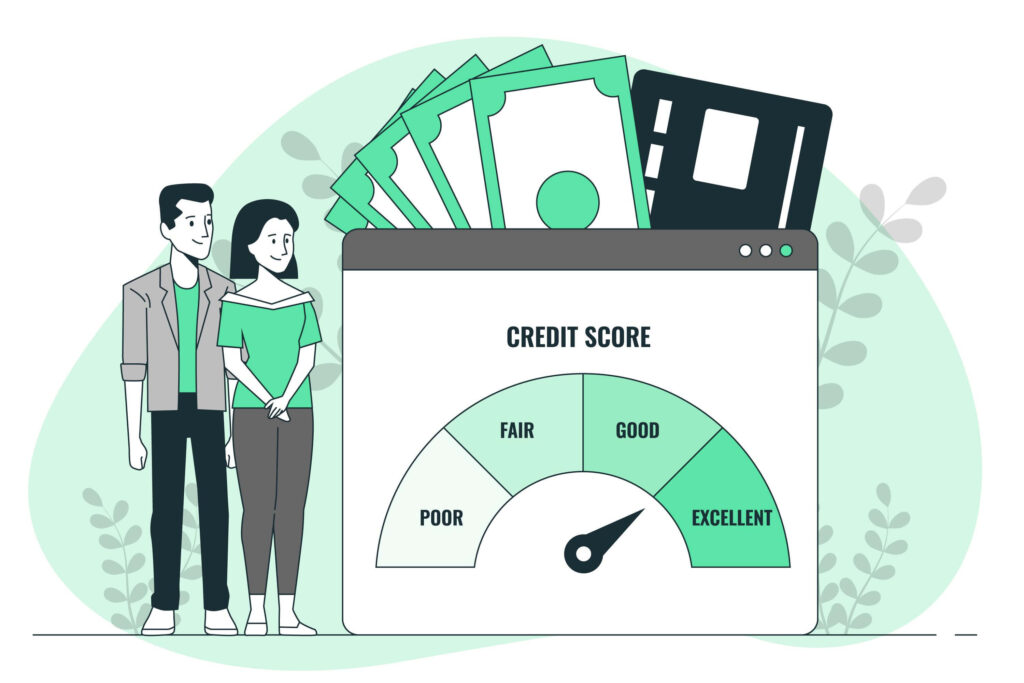A good credit score is a crucial measure of your financial health. It reflects your creditworthiness and affects your ability to secure loans, mortgages, or even rent an apartment. So, what exactly is considered a good credit score? In the United States, a FICO® Score above 670 is generally regarded as good. However, this number can vary depending on the scoring model used by lenders and the specific requirements of different industries.

Understanding what makes up a good credit score will empower you to take control of your finances and make informed decisions about borrowing and lending. Let’s delve deeper into the factors that contribute to a good credit score in order to unlock its key benefits.
Maintaining a solid payment history forms the foundation for achieving a good credit score. Paying bills on time demonstrates reliability and indicates that you are likely to honor future financial obligations. Another vital factor is keeping your credit utilization low – meaning not maxing out your available credit limit. This shows lenders that you are responsible with managing debt and not living beyond your means.
Other elements include having diverse types of accounts (such as mortgages, auto loans, or revolving lines of credit) which showcase your ability to handle different types of debt responsibly. Additionally, long-standing accounts with positive payment histories can have a positive impact on your overall score.
Now that we’ve covered these basics, let’s explore further insights into how you can improve or maintain an excellent rating for optimal financial opportunities in life
What is a good Credit Score?
- A credit score is a numerical representation of an individual’s creditworthiness. It helps lenders assess the risk associated with extending credit to someone.
- Credit scores are typically generated by credit bureaus, such as Equifax, Experian, and TransUnion, based on information from various sources like banks, creditors, and public records.
- The most commonly used credit scoring model is the FICO Score. It ranges from 300 to 850, with higher scores indicating better creditworthiness.
- Factors that influence your credit score include payment history (35% weightage), amounts owed (30% weightage), length of credit history (15% weightage), new credits (10% weightage), and types of credits used (10% weightage).
- A good or excellent credit score usually falls within the range of 670 to 850. This demonstrates responsible financial behavior and makes it easier for individuals to obtain loans at favorable interest rates.
- On the other hand, a fair or poor credit score below 670 may lead to difficulties in obtaining loans or result in higher interest rates due to perceived increased lending risk.
| Credit Score Range | Rating |
|---|---|
| 800 – 850 | Exceptional |
| 740 – 799 | Very Good |
| 670 – 739 | Good |
| 580 – 669 | Fair |
| 300 -579 | Poor |
- It’s important to note that different lenders may have their own criteria for evaluating loan applications. Some lenders might consider a lower score acceptable while others may require a higher one.
Understanding your credit score is crucial when applying for any type of financing. By maintaining good financial habits like making timely payments and keeping debt levels low, individuals can work towards improving their overall creditworthiness over time.
Remember that regularly checking your own credit report can help identify errors or inaccuracies which could negatively impact your score.
Factors That Affect Your Credit Score
When it comes to determining your creditworthiness, several factors play a crucial role in shaping your credit score. Understanding these key elements can help you maintain or improve your credit standing. Here are the primary factors that influence your credit score:
- Payment History: This is the most significant factor in calculating your credit score. Lenders want to see if you make timely payments on your debts, like loans and credit cards. Consistently paying bills on time positively impacts your score.
- Credit Utilization Ratio: This ratio compares how much of your available credit you’re using at any given time. Keeping this ratio low (ideally below 30%) shows lenders that you manage debt responsibly.
- Length of Credit History: The length of time you’ve had open accounts affects how creditors view your reliability as a borrower. Generally, a longer history demonstrates stability and improves your score.
- Types of Credit Used: Having a diverse mix of credits such as mortgages, car loans, and credit cards can be beneficial for building a good credit profile.
- New Credit Inquiries: Applying for new lines of credit leads to hard inquiries on your report and may temporarily lower your score slightly.
- Public Records and Collections: Negative public records such as bankruptcies or collections significantly impact your overall rating since they indicate financial struggles or irresponsibility with debt management.
To get an idea about the approximate weightage assigned to each factor by FICO (the leading scoring model), refer to the table below:
| Factor | Weightage Range |
|---|---|
| Payment History | 35% |
| Credit Utilization Ratio | 30% |
| Length of Credit History | 15% |
| Types of Credit Used | 10% |
| New Credit Inquiries | 10% |
Understanding these factors will enable you to make informed decisions about managing your credit and working towards a good credit score. By being mindful of these elements, you can take steps to improve your financial standing and enjoy the benefits that come with a solid credit history.
The Importance of a Good Credit Score
A good credit score is essential for maintaining financial stability and accessing various opportunities. Here’s why having a solid credit score matters:
- Loan Approval: Lenders primarily consider your credit score when assessing loan applications. A high credit score increases the chances of getting approved for loans, such as mortgages, auto loans, or personal loans.
- Interest Rates: With a good credit score, you become eligible for lower interest rates on loans and credit cards. This means reduced expenses over time and more savings in your pocket.
- Credit Card Benefits: A higher credit score can unlock access to premium rewards cards with attractive perks like cashback offers, travel benefits, or exclusive discounts.
- Renting an Apartment: Landlords often review prospective tenants’ credit scores to assess whether they are reliable in paying rent on time. A good credit score enhances your rental application by demonstrating financial responsibility.
- Insurance Premiums: Some insurance providers use credit scores as part of their risk assessment process when determining premiums for auto or home insurance policies. Maintaining a good credit history may help secure lower insurance rates.
- Employment Opportunities: Certain employers conduct background checks that include evaluating candidates’ financial standing through their credit reports. A strong credit score represents fiscal prudence and responsible behavior – qualities valued by employers filling positions involving finances or sensitive information.
How to Check Your Credit Score
To stay on top of your credit health, it’s essential to regularly check your credit score. Here are a few simple steps you can follow:
- Get a Free Copy of Your Credit Report: Start by requesting a free copy of your credit report from each of the three major credit bureaus – Equifax, Experian, and TransUnion. You can do this once every 12 months through AnnualCreditReport.com.
- Review Your Credit Report: Once you receive your credit reports, carefully review them for any errors or discrepancies that could negatively impact your credit score. Pay attention to details such as incorrect personal information, fraudulent accounts, or late payments mistakenly reported.
- Consider Credit Monitoring Services: If you want ongoing access to your credit scores and regular monitoring for changes in your reports, consider signing up for a reputable credit monitoring service. These services often provide additional features like identity theft protection and alerts whenever there are significant changes in your credit file.
- Use Online Tools and Apps: Numerous online tools and mobile apps offer free access to an estimate of your current credit score based on information from one or more bureaus. While these estimates may not be identical to the official scores used by lenders, they can still give you a general idea about where you stand financially.
- Monitor Your Accounts Regularly: Alongside checking your overall credit score periodically; make sure always keep an eye on individual accounts too – especially if you have loans or lines of credits open with various institutions.
- Improve Low Scores Through Actionable Steps: If after checking your score, you find that it is lower than expected or desired – don’t fret! Take proactive measures such as paying bills on time consistently, paying off outstanding debts promptly (especially high-interest ones), reducing balances owed where possible,and limiting new applications for loans/credit cards until things improve significantly.
By following these steps, you can stay informed about your credit score and take necessary action to improve it. Remember, a good credit score opens doors to better financial opportunities!
Improving Your Credit Score
Improving your credit score is essential for better financial opportunities and lower borrowing costs. Here are some proven strategies to boost your creditworthiness:
- Pay your bills on time: Late payments can have a significant negative impact on your credit score. Set up automatic payments or reminders to ensure you never miss a due date.
- Reduce credit utilization: Aim to keep your credit card balances below 30% of their limits. High utilization suggests financial strain and can harm your score, so consider paying down debt or requesting higher limits.
- Diversify your credit mix: Having different types of accounts (e.g., credit cards, loans) demonstrates responsible use of various forms of credit. However, avoid opening new accounts just for the sake of it; only do so if necessary.
- Minimize new applications: Each time you apply for new credit, an inquiry is recorded on your report which slightly lowers your score temporarily. Avoid multiple applications within a short period as it may raise concerns about financial instability.
- Check for errors in your reports: Regularly review all three major credit reports from Equifax, Experian, and TransUnion to spot any inaccuracies that could be hurting your score unnecessarily.
- Build a positive payment history: Consistently making timely payments over an extended period shows lenders that you’re reliable and trustworthy with borrowed money.
- Keep old accounts open: Closing old accounts reduces the average age of all active accounts and may negatively affect the length of established history considered in scoring models.
- Seek professional advice if needed: If you’re struggling with managing debts or improving your scores effectively, consider consulting a reputable non-profit consumer counseling agency for guidance tailored to fit specific situations.
Remember that improving one’s credit score takes time and patience; there are no quick fixes or shortcuts available to magically boost it overnight.
Dealing with Bad Credit Scores
When you have a bad credit score, it can feel overwhelming. But don’t worry, there are steps you can take to improve your financial situation. Here’s what you need to know about dealing with bad credit scores:
- Understand Your Credit Score: Start by obtaining a copy of your credit report from one of the major credit bureaus – Equifax, Experian, or TransUnion. Review it carefully and identify any errors or discrepancies.
- Pay Your Bills on Time: One of the most important factors that affects your credit score is payment history. Make sure to pay all your bills on time to avoid late payments and potential negative marks on your report.
- Reduce Your Debt: High levels of debt can negatively impact your credit score. Create a budget and prioritize paying off outstanding debts as quickly as possible.
- Avoid Opening New Credit Accounts: Opening multiple new lines of credit within a short period can raise red flags for lenders and lower your score further. Only apply for new accounts when necessary.
- Negotiate with Creditors: If you’re struggling to make payments, reach out to creditors or collection agencies directly and try negotiating more manageable repayment terms or settlements.
- Consider Debt Consolidation or Settlement Programs: These programs may help you consolidate multiple debts into one monthly payment or negotiate reduced balances with creditors.
- Rebuilding Your Credit History Takes Time: Improving your credit score won’t happen overnight; it takes time and discipline in managing finances responsibly.
- Work With Professional Help if Needed: If you’re overwhelmed or unsure how to proceed, consider seeking assistance from reputable credit counseling services who specialize in helping individuals improve their financial situations.
Remember that everyone’s situation is unique, so not all strategies may be applicable in every case.
Maintaining a Good Credit Score
To maintain a good credit score, it’s important to be proactive and responsible with your financial decisions. Here are some key strategies to help you keep your credit score in good shape:
- Pay Your Bills on Time: One of the most crucial factors in maintaining a good credit score is consistently paying your bills on time. Late or missed payments can have a negative impact on your creditworthiness.
- Keep Credit Card Balances Low: High credit card balances can negatively affect your credit utilization ratio, which compares the amount of available credit to the amount you’re using. Aim to keep your balances below 30% of your total available credit limit.
- Avoid Opening Too Many New Accounts: While having diverse types of accounts can positively impact your credit mix, opening too many new accounts within a short period may make lenders view you as financially unstable or desperate for funds.
- Regularly Review Your Credit Reports: Monitoring and reviewing your credit reports regularly allows you to identify any errors or discrepancies that could harm your score. If you spot any inaccuracies, promptly dispute them with the relevant reporting agency.
- Limit Credit Inquiries: Each time a lender checks your credit history when evaluating an application, it leaves an inquiry mark on your report that can slightly lower your score temporarily. Avoid unnecessary inquiries by only applying for new accounts when necessary.
- Maintain Long-Term Relationships with Lenders: Building long-standing relationships with lenders demonstrates stability and reliability, which can positively influence their perception of you as a borrower.
- Consider Automating Payments: Setting up automatic bill payments ensures that payments are made on time without requiring manual intervention each month.
By following these practices consistently over time, you’ll increase the likelihood of maintaining a good credit score and enjoy better access to loans, lower interest rates, and increased financial flexibility.
Conclusion
In conclusion, understanding the importance of a good credit score is crucial for financial stability and flexibility. A good credit score not only opens doors to better loan terms and interest rates, but it also reflects responsible financial behavior.
Maintaining a good credit score requires consistent effort in managing your finances responsibly. This includes making payments on time, keeping credit card balances low, and avoiding unnecessary debt. By doing so, you can build a positive credit history that will benefit you in various aspects of your life such as applying for loans or renting an apartment.
Remember, a good credit score is within reach for everyone with discipline and smart financial choices. So take control of your finances today and start building towards a brighter future!






